Phone:
(701)814-6992
Physical address:
6296 Donnelly Plaza
Ratkeville, Bahamas.

In the vibrant world of all gaming teams are the unsung heroes behind epic victories and nail-biting defeats. Whether they’re strategizing in the heat of battle or celebrating a hard-earned win, these squads bring together diverse talents and personalities. Each team has its own flair, from the serious strategists to the quirky jokesters, creating a dynamic that keeps fans coming back for more.
Imagine the thrill of watching a group of gamers unite, their synergy transforming ordinary gameplay into extraordinary moments. With every click and keystroke, they weave a tapestry of competition, camaraderie, and, let’s be honest, a fair share of chaos. Dive into the realm of all gaming teams, where passion meets skill and every match is a story waiting to unfold. Get ready to explore the unique identities and unforgettable moments that make these teams the heart and soul of the gaming universe.
Gaming teams serve as the backbone of competitive gaming. They encompass various roles, including players, coaches, and analysts, each contributing to the team’s overall strategy and success. Players specialize in specific games, forming units that excel in different genres such as first-person shooters, real-time strategy, and battle royale.
Diversity in gaming teams enhances performance. Teams often include individuals from various backgrounds, promoting unique perspectives and strategies. This synergy creates dynamic interactions, allowing teams to adapt to challenges on the fly.
The structure of gaming teams varies by organization. Some may consist of five players in a core roster, while others incorporate substitutes to maintain peak performance. Roster changes happen frequently, as teams seek to optimize their lineup based on individual skills and team dynamics.
Coordination stands at the heart of teamwork. Through regular practices and scrimmages, teams refine their strategies, build communication skills, and develop chemistry. Effective communication, whether through voice chat or in-game gestures, becomes essential during intense matches.
Achievements highlight a team’s skill and dedication. Major tournaments, like The International and League of Legends World Championship, showcase the pinnacle of competitive gaming. Teams that excel in these events gain recognition, sponsorships, and opportunities for growth.
Fan engagement brings gaming teams closer to their audience. Social media platforms allow fans to interact with players, fostering a sense of community. Teams often organize fan events and live streams, creating memorable experiences and strengthening their brand.
In the competitive gaming landscape, teams create a vibrant ecosystem that continues to evolve. As the industry grows, so does the significance of these teams in shaping the future of esports. Their influence expands beyond gameplay, inspiring future generations of players and fans alike.

Esports organizations play a pivotal role in shaping the competitive gaming landscape. They develop talent, create brand loyalty, and significantly impact the overall direction of the industry.
Team structures feature various roles, including players, coaches, and analysts. Players specialize in distinct game roles, which can range from sharpshooters to support characters. Coaches provide strategic oversight and adapt plans during matches. Analysts study opponents and inform the team about potential weaknesses. Communication underpins their synergy, ensuring seamless interaction among team members. Regular practices keep the team sharp, while roster changes enhance adaptability to maintain competitive edge.
Founded in 2000, Team Liquid boasts a storied history across multiple titles. Known for its success in games like Dota 2 and League of Legends, the organization invests heavily in player development. They maintain high standards, focusing on individual skill and teamwork. Team Liquid’s roster often features top-tier talent, captivating fans with their gameplay. Sponsorships from major brands bolster their presence in esports, while strong performance in tournaments solidifies their status as a powerhouse in competitive gaming.
FaZe Clan emerged as a cultural phenomenon, particularly within the Call of Duty and Counter-Strike: Global Offensive communities. Established in 2010, the organization blends competitive prowess with entertainment value. FaZe recruits skilled players and frequently collaborates with content creators. This approach expands their fanbase beyond traditional esports, creating a vibrant community. High-profile partnerships and merchandise sales amplify their reach, making FaZe Clan a trendsetter in modern gaming culture. Their consistent participation in major tournaments showcases their commitment to excellence.
Regional all gaming teams play a crucial role in the competitive esports landscape, with distinct styles and strengths that reflect their cultural backgrounds.
North American teams are known for their aggressive play styles and innovative strategies. Organizations like Team SoloMid and Cloud9 lead the charge in various titles, including League of Legends and Valorant. Team SoloMid, founded in 2009, has amassed numerous championships and loyal fans. Cloud9, established in 2013, is celebrated for its versatility across multiple games. These teams often focus on fostering new talent, ensuring a pipeline of skilled players ready for the spotlight. Competitive leagues such as the North American League of Legends Championship Series (NALCS) set the stage for incredible rivalries and community engagement.
European teams showcase a diverse range of gaming prowess and tactical depth. Renowned organizations such as Fnatic and G2 Esports dominate several titles, from Counter-Strike: Global Offensive to League of Legends. Fnatic, founded in 2004, continues to thrive with its legacy of success and strong brand presence. G2 Esports, emerging in 2013, captivates audiences through its unique player personalities and impressive performances. The European esports ecosystem benefits from a strong competitive scene, with leagues featuring top-tier talent and constant innovation. Fan engagement is robust, driven by excitement around major tournaments and streaming events.
Asian teams are often recognized for their strategic discipline and teamwork. Organizations such as T1 and Invictus Gaming significantly impact games like Dota 2 and League of Legends. T1, established in 2003, boasts a rich history of championships and a dedicated fan following. Invictus Gaming, founded in 2011, stands out for its impressive achievements in international competitions. The Asian esports scene thrives on competitive integrity and continuous improvement, with teams regularly participating in high-stakes tournaments. Networked communities foster strong fan engagement, enhancing the overall atmosphere of collaboration and rivalry.
Notable game-specific teams play a crucial role in shaping their respective competitive scenes. These teams showcase exceptional skill and strategies.
Prominent teams in Dota 2 include Team Secret and Evil Geniuses. Team Secret, founded in 2014, is recognized for its innovative strategies and consistent performance in international tournaments. Evil Geniuses, one of the oldest teams, gained fame by winning The International 2015. Their roster features players with remarkable synergy, driving success at major events. Other noteworthy teams like Virtus.pro and OG have also made significant impacts, with OG winning back-to-back International titles in 2018 and 2019. These teams’ dynamics and tactical approaches keep fans engaged and contribute to the game’s ever-evolving landscape.
Notable League of Legends teams include T1 and G2 Esports. T1, originally known as SK Telecom T1, boasts an impressive legacy, highlighted by their multiple World Championship victories. G2 Esports is known for its entertaining playstyle and unique strategies, winning the European Championship several times. Other competitive teams, like Team Liquid and Fnatic, also dominate the scene, showcasing their talents in domestic and international tournaments. The diversity in team composition and playstyle keeps the League of Legends community vibrant and continuously evolving, making every match a thrilling experience.
In CS:GO, teams like Astralis and Natus Vincere stand out. Astralis became renowned for its teamwork and strategic depth, winning major tournaments, including the Intel Grand Slam. Natus Vincere, known as Na’Vi, captured the Major Championship title in 2021, showcasing individual and team skills. Players such as s1mple and device have gained legendary status within their teams, influencing gameplay and inspiring fans. Teams like FaZe Clan and Team Vitality also contribute significantly to the competitive landscape by regularly competing at the highest levels. The competitive spirit and variety of playstyles enhance the overall enjoyment for fans of CS:GO.
Emerging trends shape the future of all gaming teams, emphasizing a shift toward professionalization and enhanced player development. New technologies like artificial intelligence improve training methods, enhancing team performance and strategies. Increased investment from sponsors points to growing interest in competitive gaming, creating opportunities for teams to expand their rosters and resources.
The integration of data analytics plays a crucial role in refining strategies, allowing teams to make informed decisions based on performance metrics. As a result, organizations focus on identifying unique player strengths and weaknesses, fostering an environment that prioritizes skill enhancement.
Collaboration with educational institutions is gaining traction, encouraging aspiring gamers to pursue careers in esports. This partnership facilitates the development of structured programs that teach essential skills, from teamwork to strategic thinking.
Fan engagement evolves alongside gaming teams, with platforms such as Twitch and social media becoming essential for connecting with audiences. Enhanced interactions through live-streams and community events foster loyalty and enthusiasm among supporters.
Diversity within teams is increasingly acknowledged as a key factor in success. Inclusive environments promote innovation, allowing for a blend of strategies and creative solutions to emerge. Teams recognizing this value are likely to attract and retain top talent.
Regional distinctions become more pronounced as teams capitalize on local cultures, leading to tailored strategies that resonate with diverse fan bases. The future competitiveness of Gaming Teams hinges on their adaptability and willingness to evolve within this dynamic landscape.
The landscape of gaming teams continues to evolve as they shape the future of esports. Their unique structures and diverse personalities foster an environment ripe for innovation and competition. With advancements in technology and increased investment, teams are better equipped to refine their strategies and enhance player performance.
As regional distinctions become more pronounced, teams are adapting to resonate with their fan bases, ensuring a vibrant competitive atmosphere. The collaboration between organizations and educational institutions further paves the way for aspiring gamers. Overall, gaming teams play a pivotal role in creating a dynamic ecosystem that inspires both players and fans, driving the growth of esports into new horizons.